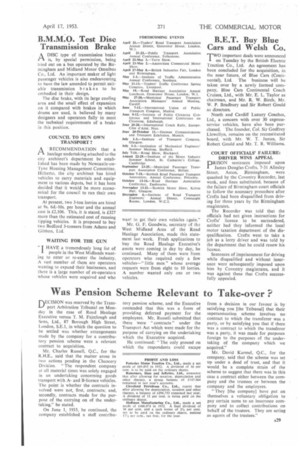Was Pension Scheme Relevant to Take-over ?
Page 31

If you've noticed an error in this article please click here to report it so we can fix it.
DECISTON was reserved by the Transport Arbitration Tribunal on Monday in the case of Road Haulage Executive versus T. M. Fajrclough and Sons, Ltd., 87 Borough High Street, London, S.E.1, in which the question to be settled was whether arrangements made by the company for a contributory pension scheme were a relevant contract to acquisition. Mr. Charles Russell, Q.C., for the RILE., said that the matter arose in two actions pending in the Chancery Division. "The respondent company at all material times was solely engaged in an undertaking concerning goods transport with Aand B-licence vehicles. The point is whether the contracts involved were not, first, contracts; and, secondly, contracts made for the purpose of the carrying on of the undertaking," he stated. On June 1, 1933, be continued, the company established a staff contribu tory pension scheme, and the Executive contended that this was a form of providing deferred payment for the employees. Mr. Russell submitted that there were " contracts " under the Transport Act which were made for the purpose of carrying on the undertaking which the Executive acquired. He continued: "The only ground on which thc respondents could escape from a decision in our favour, is by satisfying you [the Tribunal] that their superannuation scheme involves no contract to which the transferor was a party, or by satisfying you that if there was a contract to which the transferor was a party, it was made for purposes foreign to the purposes of the undertaking of the company which we acquired." Mr. David Karmel, Q.C., for the company, said that the scheme was set up under a deed of trust, and that it would be a complete strain of the scheme to suggest that there was in this case a contract either between the company and the trustees or between the company and the employees. "They [the company] have put on themselves a voluntary obligation to pay certain sums to an insurance company and to collect contributions on behalf of the trustees. They are acting as agents of the trustees."




















































































